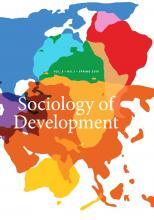
Abstract
The mass mobilizations against neoliberal reforms are rooted in the weakening of the state-led development model and the erosion of social citizenship rights. At the same time, infrastructures created by the developmental state provide the organizational capacity to resist market-driven globalization. The study develops a conceptual framework for understanding the major arenas of state-led development in the twentieth century in relation to the infrastructures and organizations that mobilize social movement campaigns against neoliberalism in the twenty-first century. Special attention is given to public education, health care, public utilities, state subsidies, and transportation networks as laying the foundation for civil society’s ability to collectively defend social protections granted in the preglobalization era in the global South.
